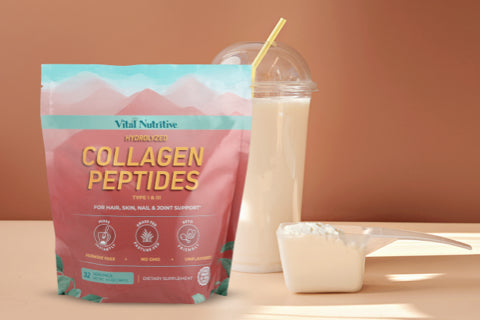You've probably heard about the benefits of collagen peptides for hair, skin, nails, and removing the odd line or two. However, you may also take collagen pre-or post-workout to maximize and enhance its benefits.
Read on to learn what collagen peptides are, how they enhance muscle growth, boost recovery, prevent injury, reduce joint pain, improve athletic performance, when to take collagen, and how to incorporate collagen pre-or post-workout.
What Are Collagen Peptides?
Collagen is the most abundant protein in your body. It is an essential long-chain amino acid for skin, bones, and connective tissues. Proline, hydroxyproline, and glycine are the three primary amino acids that makeup collagen. These three amino acids provide collagen its distinct functional features.
Your body produces collagen naturally, but as you age, collagen is depleted quicker than your body can make it, and this imbalance further worsens if you exercise often. As a result, your skin set out to loosen, and your muscles and joints deteriorate.
Additionally, your body won't take up long-chain amino acids from food. As a result, collagen is hydrolyzed or broken down into collagen peptides, and the amino acids are shortened to make them easily digestible as a nutritional supplement.
Collagen peptides include abundant amounts of glycine, hydroxyproline, and proline. They also contain arginine and all the essential amino acids.
How Collagen Peptides Can Support Your Workout Routine
Well, collagen peptides can improve your exercise or fitness routine in various ways. They may be excellent pre-or post-workout fuel.
Enhance Muscle Growth
Collagen has been found to have an anabolic impact on cartilage tissue. It facilitates the release of growth hormones. Collagen encourages growth, implying that it can help with not just muscle growth after an exercise but also joint health, tendons, and ligaments.
Moreover, the amino acids found in collagen peptides are essential components of creatine. It has been demonstrated that creatine increases muscular strength and muscle fiber size. Recent research found that males who supplemented their exercises with collagen observed an increase in fat-free mass, muscular strength, and fat reduction.
Additionally, collagen peptides also help maintain a healthy nitrogen balance in the body, which is necessary for maximizing muscle growth.
These all factors may play a significant role in muscle development and connective tissue repair after a workout.
Boost Muscle Repair
Due to oxidation, inflammatory responses, and muscle microlesions, muscle protein is depleted during and after prolonged exercise. Research indicates that protein synthesis drops during exercise and rises immediately and for an extended period after exercise.
A high-protein meal post-workout allows for restoring lost proteins, replenishing the protein content of muscles via enhancing anabolism. Collagen peptides are great for muscle repair and recovery due to their high amino acid concentration.
Prevent Injury During the Workout
Collagen supplements, taken an hour pre-workout, can help stabilize your ankles, which is critical if you're lifting weights and don't want to experience injury.
In a 2018 study examining the effect of collagen protein on the ankle stability of athletes, notable findings were discovered. For six months, the athletes took collagen peptides orally. The findings supported the hypothesis that supplementing athletes with chronic ankle instability with collagen peptides leads to significant subjective improvements in ankle stability. The reduction in ankle sprain re-injury rate throughout the follow-up period was also quite convincing for collagen's effects.
Accelerate Injury Recovery
Regeneration of muscle fibers and the formation of connective scar tissue has been recognized as the body's two primary mechanisms for repairing damaged or ruptured muscles. Collagen synthesis is essential to both processes.
In research that measured the rates of collagen protein synthesis in muscle cells for three weeks following a muscle rupture, scientists discovered that collagen synthesis rates were elevated throughout this time.
During the first week of wound healing, Type III collagen production reached its peak and was associated with the development of flexibility in connective tissue. The production of type I collagen occurred later in the healing phase and was associated with strengthening new muscle fibers and connective tissue.
Reduce Joint Pain That Comes with Athletic Injuries
According to clinical investigations, collagen peptides may lessen exercise-related joint pain. High-impact exercises and high-intensity sports place stress on the joints, resulting in discomfort and injury.
In a trial including participants with activity-related joint pain, supplementation with collagen protein for 120 days improved joint function and flexibility during the workout. Participants were able to exercise for longer without suffering joint pain.
Improve Athletic Performance

Due to the high amino acid content, collagen peptides powder is perfect for post-workout nutrition since it fulfills the body's protein requirements during and after exercise. Furthermore, creatine is necessary for muscle contraction during exercise. Collagen peptides can aid in the body's ability to synthesize creatine during brief bursts of muscular contraction, enhancing performance.
Arginine is another amino acid present in collagen. It is not as abundant as glycine or hydroxyproline, but the collagen powder contains enough to provide athletes with notable, long-lasting performance improvements. This implies that if you take collagen peptides after your workout, the results will continue over to your next workout.
When To Take Collagen Peptides?
Strenuous exercise can deplete your body of essential nutrients, but a collagen protein smoothie post-workout can help you replenish them much more quickly. In addition, glycine and proline are incredibly effective in accelerating recovery time. This will prevent you from suffering sore muscles and painful and aching joints in the hours after your workout.
However, you may also take collagen pre-workout, and it will work just as well, with some extra benefits that aren't as apparent when you use it as your primary post-workout protein. Collagen powder taken an hour pre-workout can enhance ankle stability, which is critical while lifting weights and trying to avoid injury. In addition, pre-workout collagen peptides are beneficial for maintaining a healthy nitrogen balance in the body and crucial for sustaining rapid muscle growth.
How To Incorporate Collagen Pre-or Post-Workout?

It is clear now that taking collagen peptides pre-or post-workout is beneficial for your body in terms of the regeneration of your connective tissues as well as the growth of your muscles. Remember that if you actually want collagen peptides to enhance your performance and regenerate your skin and joints, you must get them from a patented and high-quality source.
Consider using Vital Collagen Powder for pre-or post-workout recovery. It comprises type I and type III hydrolyzed collagen peptides, has a high bioavailability, is unflavored and non-GMO, and mixes easily into your morning shake or post-workout smoothie. Taking Vital Collagen Powder is like purchasing an insurance policy for your body since it helps from the inside out.
Pre-workout: Mix one scoop of Vital Collagen Powder with 250ml of hot filtered water or your favorite drink.
Post-workout: Add one scoop of Vital Collagen Powder to a green smoothie made with spinach, half an avocado, ground flaxseed, and berries.



